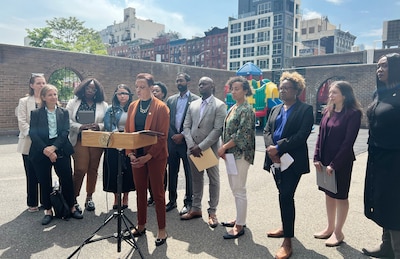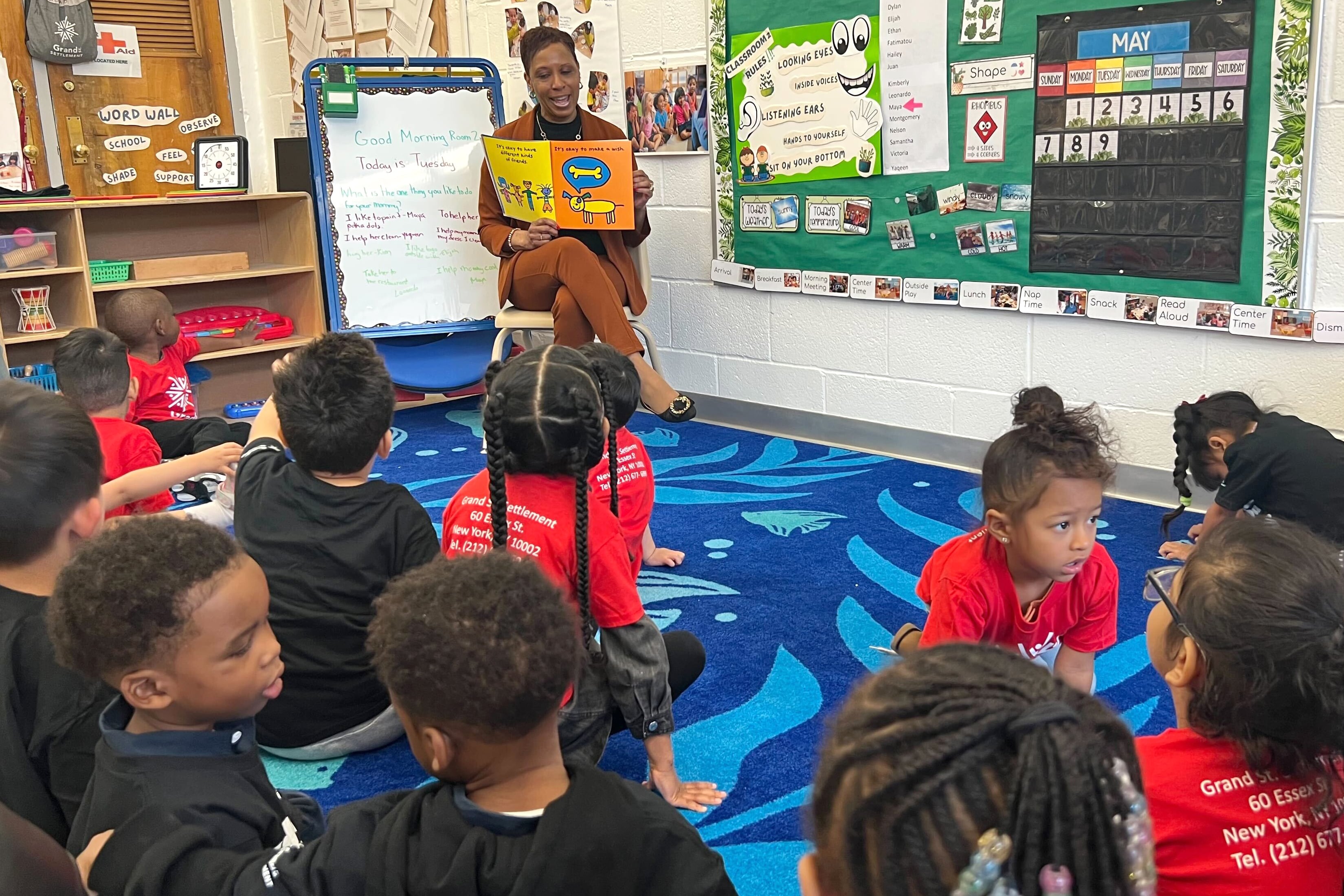Chalkbeat is a nonprofit news organization covering public education in communities across America. Sign up for Chalkbeat New York’s free daily newsletter to keep up with NYC’s public schools.
Leaders of New York City Council charged Mayor Eric Adams with failing to address problems that have plagued the city’s public preschool programs, and they made several demands to improve the system.
Speaking in the playground of a Lower East Side 3-K and prekindergarten center Tuesday, Council Speaker Adrienne Adams, several of her colleagues, and advocates listed several items they want. That includes higher pay for workers in programs run by community-based organizations, paying preschool providers on time, improving outreach to encourage more families to enroll, and allowing community organizations to directly enroll families.
The push comes as budget negotiations are underway between the council and the mayor, whose $106.7 billion proposed budget would cut funding for the education department by 3%, or $960 million. That slashes a plan under former Mayor Bill de Blasio to further expand preschool for 3-year-old children, with the Adams administration pointing to at least 16,000 unfilled seats.
Speaker Adams blasted the mayor’s approach, describing the city’s early childhood education system as “broken” and “in full crisis mode.”
“As my colleagues in the council and the advocates here today have pointed out repeatedly, the city needs to correct its course to address the gaps in our system so we provide stability for this very critical sector,” she told reporters outside the program run by Grand Street Settlement.

Mayor Adams’ first year in office has been marked by changes and sometimes chaos in the city’s early childhood education system. In addition to the cancellation of plans to expand 3-K, many providers have reported that the city has not paid them on time, which has left some programs in financial crisis and caused others to close. Despite the city’s promise to fix the problem, multiple council members said Tuesday that they’re still hearing of issues at centers across the city.
When the education department announced a bureaucratic overhaul, including moving hundreds of early childhood workers to other offices, those workers were left in limbo without clarity about what their new jobs would entail; the department later pulled back on that plan.
At the same time, the mayor has vowed to ensure the city offers enough seats to preschool students with disabilities, an issue that his predecessor failed to solve.
In a statement, education department spokesperson Nathaniel Styer credited the city’s outreach efforts, noting that applications for 3-K have increased by more than 20% compared to last year. The city, he said, has shifted 3,500 3-K and pre-K seats from “unfilled areas to areas of demand, which also includes shifting the types of seats offered to meet actual need.”
Styer added, “there is a misalignment of seats that we are tackling head on.”
Boosting worker pay at community-based organizations
For several advocacy organizations, boosting pay for teachers and other support staff is the most important issue to tackle. Better pay would mean retaining quality staff instead of losing them to programs or jobs that pay better, they argue.
Pay disparities are in part the result of the patchwork of programs that make up the city’s preschool system. Some programs are run by the education department, such as inside schools, while community-based organizations run others. Department staffers are unionized and are generally paid more than their counterparts working in community-based organizations, who tend to be women of color.
Four years ago, the city agreed to boost salaries for teachers at community organizations with a certified masters degree, to $69,000 a year by October 2021, matching the salary of a first-year teacher at the education department. The agreement didn’t include raises after that date, and it also meant a veteran teacher at a community-based organization made the same as a new education department teacher, said Gregory Brender, chief policy and innovation officer with Day Care Council.
Tara Gardner, executive director of the Day Care Council, shared an example of one disparity that still exists: An assistant teacher at a community-based organization earns 53% of their counterpart in public schools. Advocates like Gardner want pay for teachers at community-based organizations to match their years of service, as well as comparable pay for other support staff, such as paraprofessionals and custodians.
“They do the same work as staff at the DOE; the only difference is the building,” said Ayana Reefe, Head Start director for Grand Street Settlement, the community organization where Speaker Adams visited on Tuesday.
Council members will also push for $15 million to provide a longer school day and year for 1,000 3-year-olds. That funding — which would convert existing seats instead of adding more — would also include signing bonuses “to help attract and retain the necessary staff,” officials said.
Currently, many 3-K seats are only available between 8 a.m. to 3 p.m., which advocates argue don’t work for parents who work outside of those hours. In a recent survey conducted by the Citizens’ Committee for Children, one-third of more than 1,000 respondents said they were looking for child care from 8 a.m. to 6 p.m.
Styer noted that there are 11,000 unfilled seats with longer hours that go beyond the school year.
Correction: An earlier version of this story said a survey from the Citizens Committee for Children included 160 respondents due to incorrect information. In fact, there were more than 1,000 respondents.
Reema Amin is a reporter covering New York City public schools. Contact Reema at ramin@chalkbeat.org.






